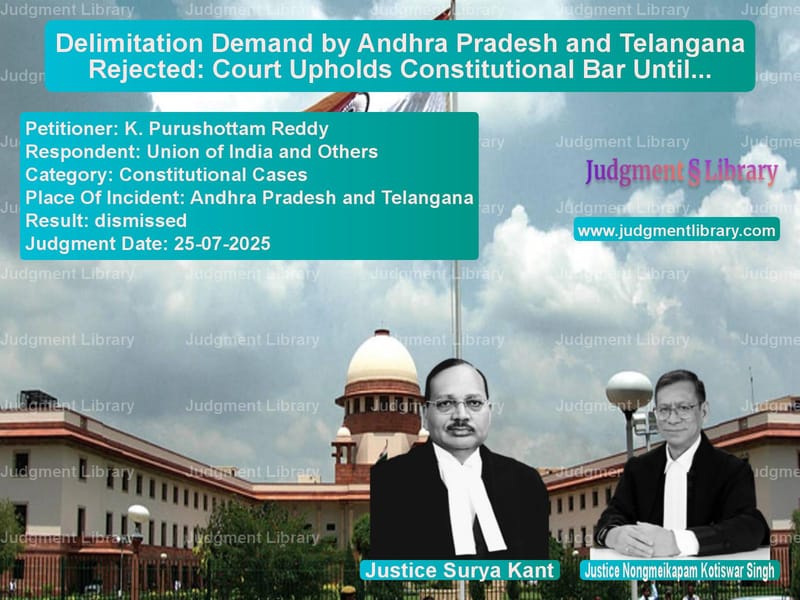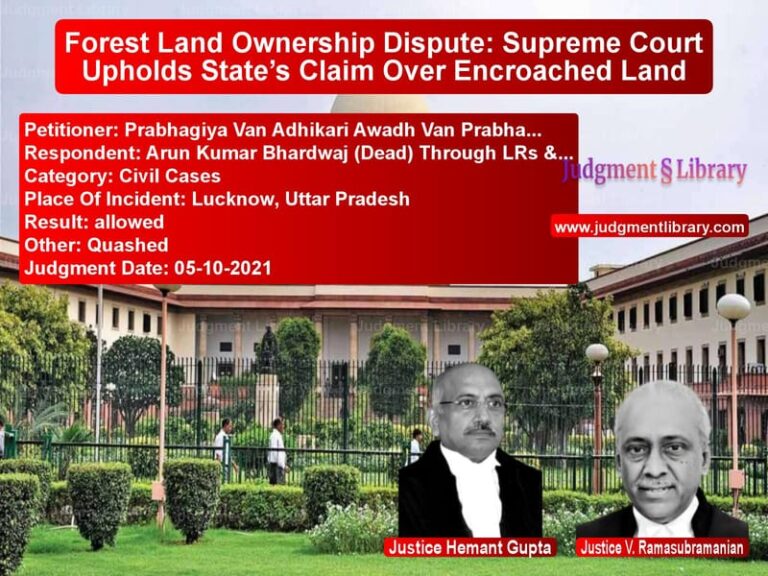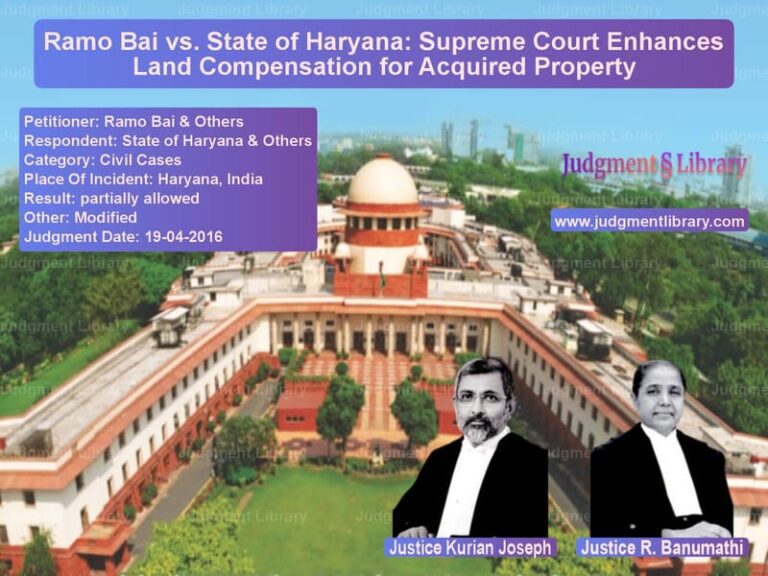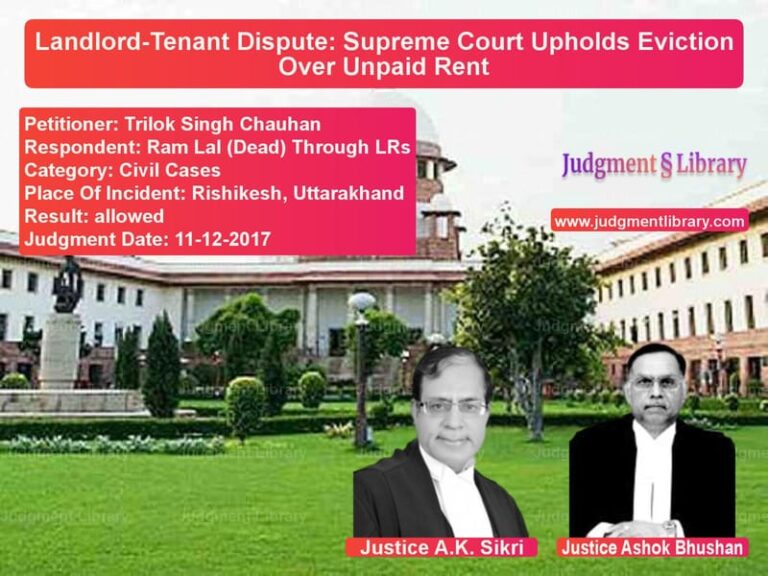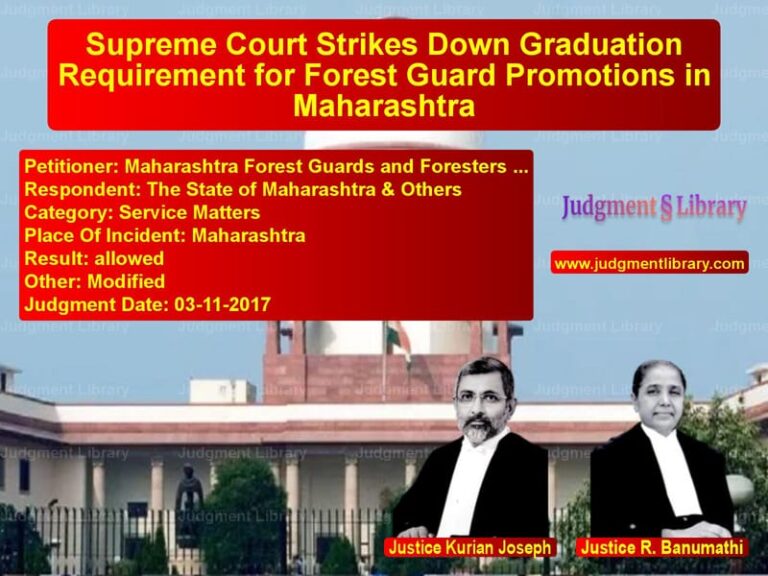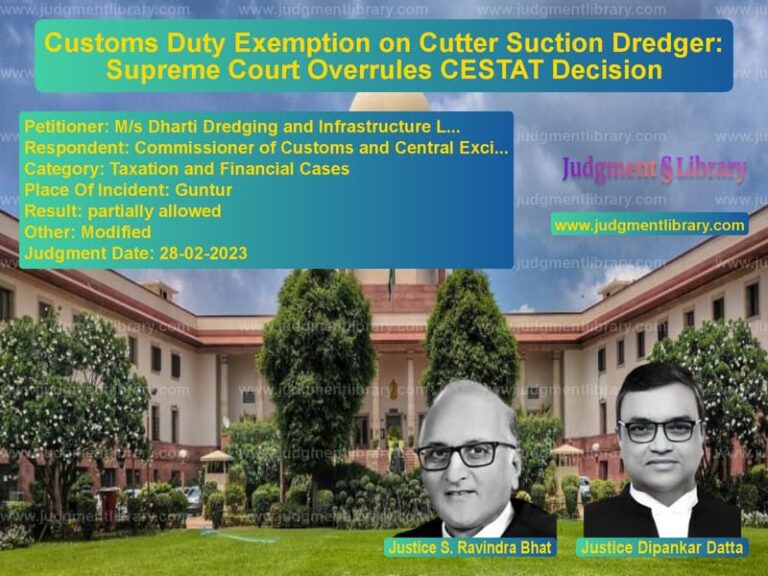Delimitation Demand by Andhra Pradesh and Telangana Rejected: Court Upholds Constitutional Bar Until 2026 Census
The Supreme Court of India on July 25, 2025, delivered a landmark judgment in the case of K. Purushottam Reddy v. Union of India & Others, addressing a complex constitutional question concerning delimitation of assembly constituencies in Andhra Pradesh and Telangana. The petitions challenged the exclusion of these two States from the 2020 and 2021 delimitation notifications issued by the Union of India, while delimitation was undertaken for the Union Territory of Jammu and Kashmir. The petitioners contended that such exclusion was arbitrary and violative of Article 14 of the Constitution. The Court, in a detailed and analytical judgment authored by Surya Kant and Nongmeikapam Kotiswar Singh, dismissed the petitions and clarified the constitutional bar against any delimitation before publication of the census data after 2026.
Background of the Case
The petitions were filed under Article 32 of the Constitution assailing two notifications: SO No. 1015(E) dated 06.03.2020 and SO No. 1023(E) dated 03.03.2021, which collectively constituted the delimitation framework for Jammu and Kashmir. The petitioners argued that while the Jammu and Kashmir Reorganisation Act, 2019 provided for increasing Assembly seats in J&K, a similar provision under Section 26 of the Andhra Pradesh Reorganisation Act, 2014—which mandated an increase in seats from 175 to 225 in Andhra Pradesh and from 119 to 153 in Telangana—had not been implemented. They claimed that the exclusion of these States from the delimitation process violated Article 14’s equality clause and the legitimate expectation of citizens to fair representation.
The Court took note that the 2020 notification had constituted a Delimitation Commission under Section 3 of the Delimitation Act, 2002, for Jammu and Kashmir and certain northeastern States, but the 2021 notification restricted its jurisdiction solely to Jammu and Kashmir. The petitioners contended that such exclusion of Andhra Pradesh and Telangana, despite statutory backing under the AP Reorganisation Act, was discriminatory.
Arguments by the Petitioners
The petitioners’ counsel, Mr. Rao Ranjit, argued that the non-inclusion of Andhra Pradesh and Telangana in the delimitation process was arbitrary and unconstitutional. He submitted that Section 26 of the AP Reorganisation Act unambiguously directed that “the number of seats in the Legislative Assembly of the successor States of Andhra Pradesh and Telangana shall be increased from 175 and 119 to 225 and 153 respectively.” According to him, the Union of India’s failure to act upon this provision frustrated the legislative intent and violated Article 14.
Mr. Ranjit further contended, verbatim, that “the exclusion of Andhra Pradesh and Telangana from the delimitation exercise suffers from the vice of intelligible differentia and is thus violative of Article 14 of the Constitution.” He submitted that the electorate of these States had a “legitimate expectation” that the Central Government would implement Section 26 in the same manner as it acted for Jammu and Kashmir.
Arguments by the Respondents
The Union of India, represented by Solicitor General Tushar Mehta and Additional Solicitor General K.M. Nataraj, opposed the petitions, arguing that no delimitation could legally be undertaken before the publication of census data after 2026 due to the constitutional freeze imposed by the proviso to Article 170(3). The Solicitor General stated that “no readjustment of seats or division of States into territorial constituencies can be undertaken until the relevant data from the first census conducted after 2026 is published.” Hence, the petitioners’ claim was “wholly misconceived and contrary to the constitutional embargo.”
The respondents also asserted that delimitation in Jammu and Kashmir was constitutionally distinct because J&K, being a Union Territory, was governed by Article 239A, whereas Andhra Pradesh and Telangana were governed by Article 170 applicable to States. Therefore, the claim of parity was “legally unsustainable.”
The Election Commission of India, represented by Senior Advocate Maninder Singh, concurred with the Union of India, emphasizing that “the Commission only facilitates the process of delimitation but cannot decide its initiation or scope.” He supported the view that Article 170(3) barred any delimitation before the 2026 census.
Observations and Reasoning of the Court
The Bench began by analyzing Section 26 of the AP Reorganisation Act and Article 170 of the Constitution in detail. The judgment stated that Section 26, while prescribing an increase in Assembly seats, expressly began with the phrase “subject to the provisions contained in Article 170 of the Constitution.” The Court held that this prefatory clause “cannot be read as surplusage and must be given full legal effect.”
Justice Surya Kant observed: “A plain and harmonious reading of the statutory and constitutional provisions makes it evident that Section 26 of the AP Reorganisation Act is expressly made ‘subject to’ the mandate contained in Article 170 of the Constitution. Any other construction of Section 26 would fall foul of both the language and conception of Article 170.”
The Bench emphasized that the proviso to Article 170(3) “unequivocally provides that it shall not be necessary to readjust the allocation of seats in the Legislative Assembly of each State until the relevant figures for the first census taken after the year 2026 have been published.” Consequently, any demand for delimitation prior to that would violate the constitutional timeline.
The Court cautioned that accepting the petitioners’ plea would “open the floodgates to similar demands from other States, each seeking early delimitation on grounds of parity.” It warned that such judicial intervention “would destabilize the uniform electoral framework envisaged by the Constitution and blur the demarcation between constitutional prescription and political discretion.”
The Bench further declared: “Permitting such isolated departures from the constitutional embargo would amount to an impermissible deviation from the equality principle embedded in Article 14 of the Constitution, and would amount to a facially discriminatory practice without any valid classification.”
On Parity with Jammu and Kashmir
Rejecting the argument for parity with Jammu and Kashmir, the Court cited its earlier ruling in Haji Abdul Gani Khan v. Union of India, stating verbatim: “Hence, as far as the Legislative Assembly of the Union territory of J&K is concerned, Article 170 will have no application as it forms a part of Chapter III of Part VI which deals with only the State Legislature. The Legislative Assemblies of Union Territories will be governed by laws made under Article 239A and not by the provisions of Chapter III of Part VI.”
The Court held that since Andhra Pradesh and Telangana were governed by Article 170, the constitutional freeze applied fully to them, and the comparison with Jammu and Kashmir was “wholly misplaced.”
Doctrine of Legitimate Expectation
The petitioners also relied on the doctrine of legitimate expectation, claiming that citizens of Andhra Pradesh and Telangana had a reasonable expectation of seat enhancement as promised by Section 26. However, the Court rejected this argument, stating that while the doctrine is “rooted in fairness, it cannot override an express constitutional bar.”
The Court explained: “The doctrine of legitimate expectation cannot be invoked to compel an authority to act contrary to a binding legal or constitutional command. While it may guide discretionary powers, it cannot defeat constitutional limitations.” It observed that any expectation arising from Section 26 “must yield to Article 170(3), which constitutionally defers the delimitation exercise until after the 2026 census.”
Final Judgment
Concluding the judgment, the Court held: “The exclusion of the States of Andhra Pradesh and Telangana from the purview of the delimitation process under the impugned notifications does not suffer from arbitrariness or discrimination. The distinction drawn is firmly anchored in the constitutional structure, particularly the proviso to Article 170(3), which expressly bars any readjustment of seats in the Legislative Assemblies until the first census after 2026.”
Accordingly, the writ petitions were dismissed as being devoid of merit. The Court clarified that the delimitation in Jammu and Kashmir “cannot be analogically extended to States bound by the constitutional restraint imposed under Article 170(3).” Pending applications were disposed of.
This ruling reinforces constitutional discipline in electoral matters and underlines the limits of judicial intervention in processes that are explicitly governed by constitutional timelines and legislative prerogatives.
Petitioner Name: K. Purushottam Reddy.Respondent Name: Union of India and Others.Judgment By: Justice Surya Kant, Justice Nongmeikapam Kotiswar Singh.Place Of Incident: Andhra Pradesh and Telangana.Judgment Date: 25-07-2025.Result: dismissed.
Don’t miss out on the full details! Download the complete judgment in PDF format below and gain valuable insights instantly!
Download Judgment: k.-purushottam-reddy-vs-union-of-india-and-o-supreme-court-of-india-judgment-dated-25-07-2025.pdf
Directly Download Judgment: Directly download this Judgment
See all petitions in Constitution Interpretation
See all petitions in Legislative Powers
See all petitions in Public Interest Litigation
See all petitions in Judgment by Surya Kant
See all petitions in Judgment by N. Kotiswar Singh
See all petitions in dismissed
See all petitions in supreme court of India judgments July 2025
See all petitions in 2025 judgments
See all posts in Constitutional Cases Category
See all allowed petitions in Constitutional Cases Category
See all Dismissed petitions in Constitutional Cases Category
See all partially allowed petitions in Constitutional Cases Category

